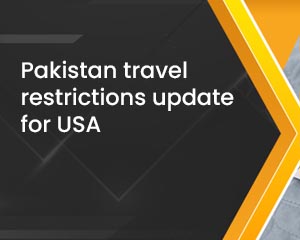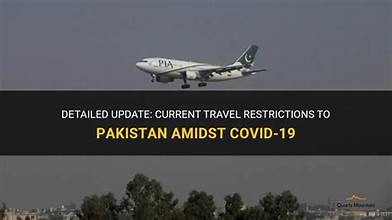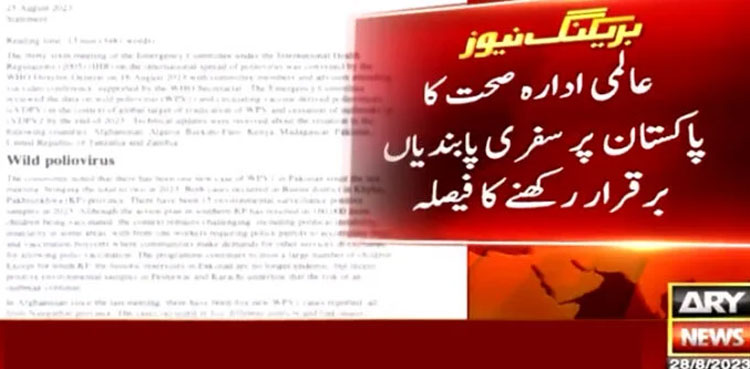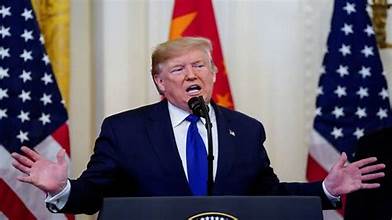In a recent development, the World Health Organization (WHO) has issued an updated advisory regarding travel restrictions to and from Pakistan. This announcement comes amid ongoing public health concerns and persistent efforts to control the transmission of infectious diseases, most notably polio. The new travel guidelines are designed to ensure global safety while supporting Pakistan’s commitment to meeting international health regulations.
Background of WHO’s Travel Advisory System
The WHO issues travel advisories and restrictions primarily in response to disease outbreaks that pose a global health risk. These recommendations are aligned with the International Health Regulations (IHR 2005), which aim to prevent and respond to the international spread of diseases while minimizing interference with international traffic and trade.
Pakistan, along with a few other countries, has been under WHO travel advisories for several years, largely due to the persistence of wild poliovirus transmission within its borders. Despite extensive vaccination drives and public health campaigns, the country has struggled to completely eliminate the virus due to various socio-political and logistical challenges.
The Latest WHO Update for Pakistan
In its latest update, the WHO has extended the existing travel recommendations for Pakistan, reaffirming the country’s status as a “State infected with wild poliovirus, with potential risk of international spread.” According to the advisory, all residents and long-term visitors (over four weeks) are advised to receive a dose of Oral Polio Vaccine (OPV) or Inactivated Polio Vaccine (IPV) four weeks to 12 months prior to international travel.
Additionally, travelers are required to carry proof of vaccination, known as the International Certificate of Vaccination or Prophylaxis (ICVP). This measure is particularly critical for those heading to polio-free countries where authorities are vigilant about preventing the reintroduction of the virus.

Rationale Behind the Continued Restrictions
The WHO’s decision is based on careful evaluation of Pakistan’s epidemiological data. Although the number of polio cases has significantly reduced in recent years, the virus remains endemic in certain areas, particularly in the provinces of Khyber Pakhtunkhwa and Balochistan.
Surveillance reports also show the presence of poliovirus in environmental samples collected from major cities, indicating ongoing circulation. Given the risk of international transmission, especially through frequent travel between Pakistan and neighboring countries, the WHO considers these travel restrictions as a necessary preventive strategy.
Impact on Travelers and the Aviation Sector
For Pakistani travelers, this update means that polio vaccination remains a prerequisite for international travel. This can affect travel plans, especially for those unaware of the requirement or those living in remote regions with limited access to vaccination centers.
Airlines and travel agencies operating in and out of Pakistan will also continue to ensure that passengers comply with the WHO-mandated vaccination requirement. Failure to present valid vaccination documents could result in denial of boarding or entry into other countries.
The restrictions also impact Pakistani expatriates and students abroad, who may face additional documentation requirements while re-entering or leaving the country. However, most embassies and consulates of Pakistan provide vaccination services and facilitate travelers in obtaining the ICVP.
Pakistan’s Response and Ongoing Efforts

The government of Pakistan, in collaboration with WHO, UNICEF, and local health organizations, has been proactive in addressing the concerns raised in the advisory. National Immunization Days (NIDs) and targeted door-to-door campaigns are routinely conducted across the country to ensure every child receives the polio vaccine.
The Emergency Operations Center (EOC) for Polio Eradication has also improved its tracking, reporting, and response mechanisms. Mobile vaccination units have been deployed at border crossings, airports, and train stations to reach high-risk populations, including nomadic communities and internally displaced persons.
Despite security challenges in some regions, vaccinators continue to work in difficult conditions, often with the support of law enforcement agencies, to ensure maximum coverage.
Challenges Hindering Eradication
Eradicating polio from Pakistan remains a complex challenge. Misinformation, vaccine hesitancy, and cultural barriers continue to obstruct immunization efforts in certain communities. Moreover, operational gaps, such as underreporting of cases and logistical hurdles in rural areas, slow down the progress.
Cross-border transmission between Pakistan and Afghanistan—another polio-endemic country—further complicates the situation. Both countries share porous borders and cultural ties, making coordinated regional efforts essential.
Global Implications
The WHO’s travel advisory is not merely a reflection of Pakistan’s internal health situation but also a measure to protect the global community. As long as polio exists in any part of the world, all countries remain at risk. The virus can easily travel across borders, especially in our highly interconnected world.
The continuation of travel restrictions underlines the importance of international solidarity in public health. It is a reminder that disease eradication is a global responsibility and not limited to national boundaries.
Conclusion
The WHO’s latest update on travel restrictions for Pakistan is a balanced response to the ongoing polio threat. While it poses certain challenges for travelers and authorities, it serves as a crucial line of defense against global resurgence of the virus.
Pakistan’s efforts toward polio eradication are commendable, but more work lies ahead. With sustained commitment, stronger public awareness, and international cooperation, the country can achieve its long-standing goal of becoming polio-free. Until then, measures like these travel restrictions remain necessary to safeguard global public health.



